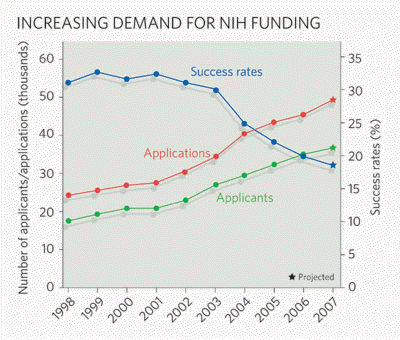|
|
|
|
|
|
|
News & Views item - September 2007 |
![]() Peer Review at the US National Institutes of Health Destined to Be Given
an Extreme Makeover. (September 13, 2007)
Peer Review at the US National Institutes of Health Destined to Be Given
an Extreme Makeover. (September 13, 2007)
The NHMRC's external audit will be looking toward an initiative currently being undertaken by the US National Institutes of Health. The US$29 billion dollar institution is looking into ways that it can usefully reform its peer review system.
According to an editorial in this week's Nature in the mid-nineteen-eighties some 1800 reviewers assessed "grant applications for the NIH's Center for Scientific Review, which oversees the lion's share of the agency's
 |
| Credit: FASEB/NIH/SCIENCE |
peer review; today, that number is more than 18,000."
For several reasons the increased requirements for grant application reviews has developed an unsustainable burden on the system. ad hoc and junior reviewers are now called upon as Nature describes it with: "the former to provide expertise on complex multidisciplinary grants, the latter because of volume and because senior scientists feel that they have already paid their dues with earlier service."
Nature also reports that scientific-society leaders were solicited for ideas in a meeting held in Washington DC this past summer, and more researchers' opinions are being sought at meetings in Chicago, New York and San Francisco this month and next.
In addition over a two-month period that ended last Friday some 2,000 emailed comments have been obtained.
After what will be a winnowing out of what are considered the most interesting (including even radical) suggestions several pilot studies will be undertaken.
Nevertheless it is considered imperative that senior, accomplished scientists serve on study sections, i.e. there's no substitute for the brains, experience, insight and judgement that they bring to bear on applications.
Just where this puts metrics in all of this isn't alluded to. But one strong suggestion being put forward is, if you are or become an NIH grantee, you'll have an obligation to serve on study sections.
One approach that has been put forward is to impose a self-limited initial "review". For example each principal investigator would be allowed to have only one application of a given kind in the system at any one time. "Multiple grants could still be held by one scientist, but he or she could have only one application per mechanism under review."
While both the NHMRC and the ARC would undoubtedly benefit from being privy to the discussions and suggestions being offered, surely if there is an insistence for the Research Quality Framework to be introduced as an additional layer of review, those responsible for its implementation should be aware of the NIH's study.